Introduction
Are you a rabbit owner looking to make sure your furry friend is getting the best care possible? You’re in the right place!
You might already know that rabbits need a balanced diet to stay healthy, but did you know that water is a crucial part of that equation? It’s true!
But how much water do they actually need? And are there any other beverages they can safely consume?
We’ll be answering all those questions and more in this informative article. We’ll discuss why water is so important for rabbits and how it helps them prevent dehydration, aid in digestion, and regulate their body temperature.
But we won’t stop at water! We’ll also explore the myth of non-dairy milk for rabbits and whether it’s safe or necessary.
And don’t worry, we haven’t forgotten about hydration-rich foods! We’ll be discussing the importance of incorporating hydrating foods into a rabbit’s diet and suggest some options that your bunny will love.
So if you’re ready to learn all about keeping your rabbit hydrated and healthy, let’s jump right in. Trust us, your fluffy friend will thank you for it!
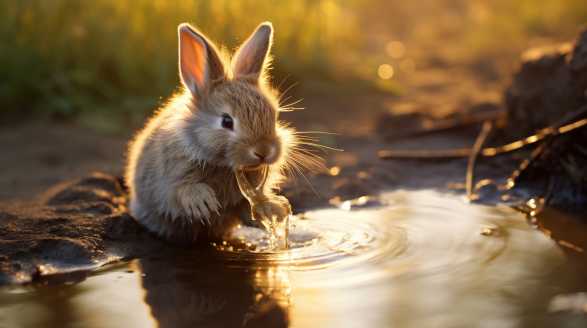
Key Takeaways
- Water is essential for rabbits’ overall health and well-being, preventing dehydration, aiding digestion, and regulating body temperature.
- On average, rabbits should consume 50-150ml of water per kg of body weight per day.
- Fresh tap water, filtered water, and spring water are all suitable water sources for rabbits.
- Non-dairy milk for rabbits is not necessary and can disrupt their sensitive digestive system.
- Juices and smoothies can be offered to rabbits in moderation, but they should not replace their primary diet of hay and vegetables.
- Hydrating foods such as lettuce, cucumber, and watermelon are important for maintaining hydration in rabbits.
- Water quality is crucial, and various filtering and purifying options can be used to ensure clean and safe water for rabbits.
- Rabbits should receive a balanced diet primarily consisting of hay, fresh vegetables, and water.
- Vegetable juices can be offered to rabbits, such as carrot juice and beetroot juice, but they should be diluted with water.
- Herbal infusions like chamomile and peppermint tea can soothe digestive issues in rabbits when served at room temperature.
- Fruit blends like apple and mint can provide an exciting beverage option for rabbits, but moderation is key.
Water: The Essential Drink for Healthy Rabbits
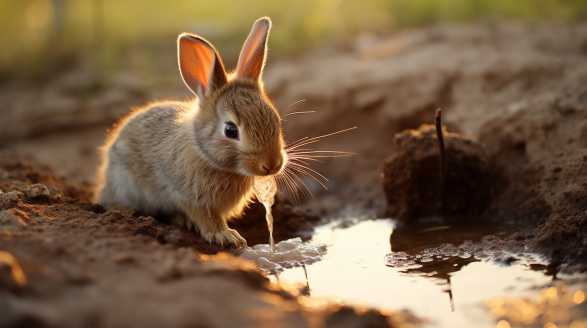
When it comes to keeping our furry friends healthy and happy, providing them with the right nutrition is crucial. While we all know that rabbits need a balanced diet rich in fiber and nutrients, many people overlook the importance of water in their pet’s daily routine.
Why is Water Important for Rabbits?
1. Preventing Dehydration
Just like humans, rabbits need water to survive and thrive. Dehydration can lead to serious health issues for our furry friends, so it is essential to provide them with a constant supply of fresh water.
By offering your rabbit access to clean drinking water, you can help prevent dehydration and its associated complications.
2. Aiding Digestion
Water plays a vital role in the digestion process of rabbits. As herbivores, rabbits consume a diet high in fiber, which can be tough on their digestive system.
Without enough water, rabbits may suffer from digestive issues such as blockages and gastrointestinal stasis.
3. Maintaining Body Temperature
Rabbits are highly sensitive to changes in temperature, and proper hydration is essential for regulating their body temperature. During hot weather, rabbits can cool themselves down by drinking water and evaporation through their nasal passages.
How Much Water Should a Rabbit Drink?
The amount of water a rabbit needs can vary based on factors such as their size, weight, diet, and environment. However, on average, a healthy adult rabbit should consume approximately 50 to 150 milliliters (about 2 to 5 ounces) of water per kilogram of body weight per day.
How to Ensure Your Rabbit Stays Hydrated
1. Choosing the Right Water Dispenser
To provide your rabbit with a constant supply of fresh water, it’s important to choose the right water dispenser. There are various options available, including water bowls and water bottles.
Whichever option you choose, ensure it is cleaned regularly to prevent the buildup of bacteria.
2. Freshen the Water Daily
Rabbits are known to be picky about their water, so make sure you refresh their water supply daily. Stagnant water can become unappealing to rabbits and may discourage them from drinking enough.
3. Monitor Water Intake
Keeping an eye on your rabbit’s water intake is essential to ensure they are drinking enough. If you notice a sudden decrease in their water consumption, it could be a sign of an underlying health issue.
Monitor their drinking habits and consult a veterinarian if you notice any significant changes.
4. Offer Water-Rich Foods
While providing fresh water is crucial, you can also help hydrate your rabbit by offering them water-rich foods. Fresh leafy greens such as lettuce, cucumber, and celery have a high water content and can contribute to your rabbit’s hydration.
5. Consider Water Additives
In some cases, rabbits may be reluctant to drink plain water. If your rabbit is showing a lack of interest in drinking, you can consider using water additives specifically designed for rabbits.
Water is an essential drink for healthy rabbits. It prevents dehydration, aids digestion, and helps maintain their body temperature.
Remember to offer water-rich foods and consider using water additives if necessary. Keeping your rabbit hydrated is a simple yet vital aspect of their overall wellbeing.
Quality over Quantity: Best Water Sources for Rabbits
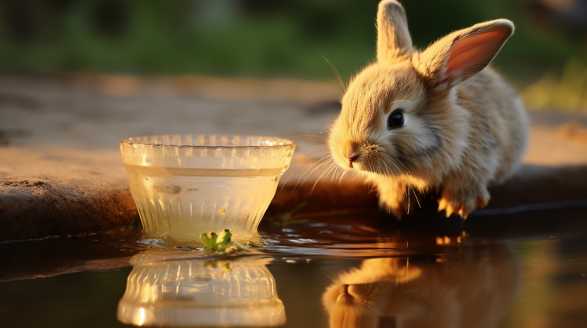
Do you have a fluffy little friend at home who hops around joyfully, bringing a smile to your face? Rabbit owners like you know just how important it is to provide the best care for these adorable creatures.
we will explore the best water sources for rabbits, focusing on the quality over quantity approach to keep your pet hydrated and healthy.
Why is Quality Water Essential for Rabbits?
Rabbits, just like any living being, require water to survive. Water plays a vital role in maintaining their overall health and well-being.
Providing high-quality water is crucial to prevent dehydration and numerous health issues that may arise from poor water quality.
The Importance of Clean Water for Rabbits
Rabbits are sensitive creatures, and their health can be greatly affected by the water they consume. Clean water is necessary to avoid potential contaminants that may cause diseases, digestive problems, or even death.
1. Preventing Bacterial Infections:
Dirty or contaminated water can contain harmful bacteria like E. coli or Salmonella, which can lead to serious health issues in rabbits. Providing clean water reduces the risk of bacterial infections and keeps your furry friend safe.
2. Minimizing Digestive Disorders:
Unclean water may contain impurities and toxins that can upset your rabbit’s delicate digestive system. Rabbits are prone to gastrointestinal stasis, a condition where their digestive system slows down or completely stops.
3. Reducing the Risk of Urinary Tract Problems:
Rabbits are highly susceptible to urinary tract problems, such as bladder sludge or stones. Ensuring that your rabbit drinks clean water can help prevent the formation of these painful and potentially life-threatening conditions.
Best Water Sources for Rabbits
Now that we understand the significance of providing clean water to rabbits, let’s explore the best water sources for your furry companions:
1. Fresh Tap Water
Tap water is often the most convenient and easily accessible water source. However, it’s crucial to ensure the tap water itself is free from contaminants.
- Use a good quality water filter to remove chlorine, heavy metals, and other impurities.
- Allow the water to run for a few seconds to flush out any stagnant water from the pipes.
2. Filtered Water
Filtered water is an excellent option to eliminate impurities and ensure a higher quality water source for your rabbits. Consider using a filter that removes chlorine, heavy metals, pesticides, and other harmful substances.
3. Fresh Spring Water
If you have access to fresh spring water, it can be an ideal choice for your rabbits. Spring water is naturally sourced and often free from added chemicals.
4. Bottled Water
Bottled water can be a suitable option if you are unable to provide tap water or have concerns about its quality. Look for bottled water labeled as “spring water” or “purified water.”
5. Rainwater
Rainwater is a natural and free water source, especially during the rainy season. However, it’s important to note that rainwater can be contaminated by pollutants in the environment.
Additional Tips for Providing High-quality Water
To further ensure your rabbits have access to the best water sources, consider the following tips:
- Clean the water containers regularly to prevent the buildup of algae or bacteria.
- Provide multiple water sources throughout your rabbit’s living area to promote accessibility.
- Ensure the water containers are stable and spill-proof to avoid accidents and unnecessary mess.
- Monitor your rabbit’s water intake and check for any changes in consumption. Increased or decreased water intake could indicate an underlying health issue.
Quality water is essential for maintaining the health and well-being of your beloved rabbits. By prioritizing clean water sources and avoiding potential contaminants, you can ensure your furry friends live a long and happy life.
Your rabbits will appreciate the effort, and you will have the peace of mind knowing you are providing them with the best care possible.
Juices and Smoothies: Are They Suitable for Rabbit Consumption?
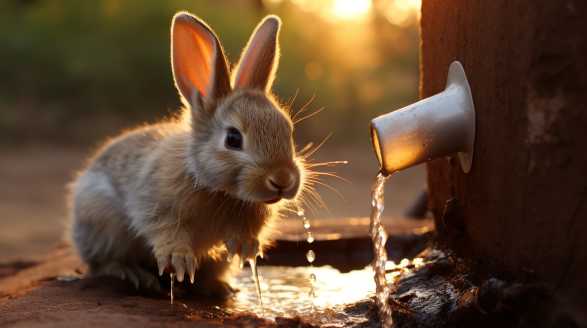
As a rabbit enthusiast and owner of several adorable bunnies, I have always been curious about their dietary needs and the various options available for their consumption. While rabbits primarily thrive on hay, vegetables, and pellets, the question of whether juices and smoothies can be a part of their diet has always intrigued me.
So, let’s look into the fascinating world of juices and smoothies for our furry friends!
The Rabbit Diet: Essential Components
Before exploring the addition of juices and smoothies to a rabbit’s diet, let’s quickly discuss what constitutes a healthy rabbit diet. These adorable creatures are herbivores, which means their diet consists mainly of plants.
- Hay: High-quality grass hay (such as timothy, orchard, or oat hay) is a staple in a rabbit’s diet. It provides essential fiber, aids in digestion, and helps maintain dental health.
- Vegetables: Fresh, leafy greens and vegetables should make up about 15-20% of a rabbit’s daily food intake. Favorites include romaine lettuce, spinach, kale, and parsley.
- Pellets: Rabbit pellets formulated specifically for their nutritional needs should be given in limited quantities (approximately 1/4 to 1/2 cup per day). These pellets provide necessary vitamins and minerals.
- Water: Clean, fresh water should always be readily available to rabbits. It is crucial for proper hydration and overall well-being.
Now that we have a basic understanding of a rabbit’s dietary requirements let’s explore the concept of juices and smoothies. Juices and smoothies are primarily made from fruits and vegetables and often have a variety of health benefits for humans due to their nutrient content.
The Pros and Cons of Juices and Smoothies for Rabbits
The Pros:
- Hydration: Juices and smoothies can provide additional hydration for rabbits, particularly during hot weather or if a rabbit isn’t drinking enough water.
- Variety: Introducing juices and smoothies can add variety to a rabbit’s diet, making mealtime more exciting and enjoyable. This can be especially useful when trying to entice picky eaters or introducing new foods.
The Cons:
- Sugar Content: Fruits and vegetables used in juices and smoothies can have high sugar content, which can be harmful to rabbits. Excessive sugar intake may lead to digestive issues, obesity, or tooth decay.
- Digestive Sensitivity: Rabbits have a sensitive digestive system, and sudden changes or excessive amounts of new foods can cause gastrointestinal upset. Juices and smoothies should be introduced gradually and in moderation.
- Missing Fiber: While juices and smoothies may retain some fiber content, they often lack the necessary amount typically found in whole fruits and vegetables. This may affect a rabbit’s digestion and overall health.
Recommendations and Guidelines for Offering Juices and Smoothies
Based on extensive research and expert advice, here are some recommendations and guidelines for incorporating juices and smoothies into your rabbit’s diet:
Moderation is Key:
- Introduce juices and smoothies gradually and assess your rabbit’s reaction and tolerance.
- Limit the offering of juices and smoothies to occasional treats rather than a regular part of their diet.
- Look for recipes with low sugar content, prioritizing low-sugar fruits and vegetables.
- Aim to limit the juice or smoothie serving to roughly two tablespoons per day.
Choose Rabbit-Safe Ingredients:
- Opt for rabbit-safe fruits and vegetables, such as apples (without seeds), berries, carrots, and leafy greens (e.g., parsley or cilantro).
- Avoid toxic fruits and vegetables, including avocado, grapes, onions, and rhubarb.
- Always wash produce thoroughly to remove dirt, pesticides, or any potential harmful substances.
Prepare Fresh and Safe Mixtures:
- Ensure that the juices and smoothies are fresh and prepared using clean equipment and ingredients.
- Avoid buying pre-packaged juices or smoothies, as they often contain additives, preservatives, or excess sugar, which are not suitable for rabbits.
While juices and smoothies can offer hydration and variety to a rabbit’s diet, it is essential to approach this addition with caution. Moderation, careful ingredient selection, and monitoring your rabbit’s response are crucial.
Consulting with a veterinarian who specializes in rabbit care is highly recommended to ensure you are providing the best diet for your furry friend. Now, go forth and delight your rabbit with a well-researched and carefully prepared juice or smoothie!
Non-Dairy Alternatives: Milk for Rabbits – A Myth or a Must-Have?
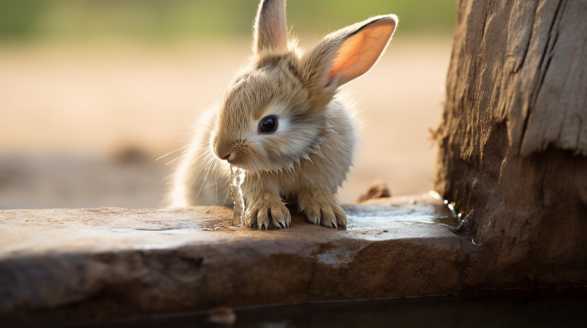
As a rabbit owner, I’ve often wondered about the possibility of providing my furry friend with non-dairy alternatives, specifically milk. I’ve come across conflicting information and numerous myths regarding this topic.
The Rabbit’s Digestive System
Before we look into the world of non-dairy alternatives, it’s important to understand the unique digestive system of rabbits. These adorable creatures are herbivores, primarily consuming hay, fresh greens, vegetables, and some fruits.
The Myth of Non-Dairy Milk for Rabbits
Lactose Intolerance
The most common myth surrounding non-dairy milk for rabbits stems from a misunderstanding of their ability to digest lactose, a natural sugar found in milk. It is widely believed that rabbits are lactose intolerant, just like many humans.
While it is true that rabbits have a lower tolerance for lactose compared to other mammals, such as cats or dogs, their digestive system can still handle small amounts of lactose. In fact, rabbit kits (baby rabbits) rely on their mother’s milk, which contains lactose, during their early developmental stage.
Essential Nutrients
Another aspect of the myth surrounding non-dairy milk for rabbits is the misconception that they require the nutrients present in milk. While milk is indeed a nutritious source of calcium and protein for many animals, rabbits have specific dietary needs that differ from other mammals.
Rabbits mainly obtain their essential nutrients, such as calcium and protein, from their primary diet of hay and fresh greens. These sources provide them with the necessary nutrients in a form that their digestive system is designed to process efficiently.
Digestive Disruption
Introducing non-dairy milk into a rabbit’s diet can potentially cause digestive disruption. Rabbits have sensitive digestive systems, and any sudden changes to their diet can lead to gastrointestinal issues such as diarrhea or bloating.
Safe Non-Dairy Alternatives for Rabbits
Although the myth of non-dairy milk being a must-have for rabbits has been debunked, there are some safe non-dairy alternatives that can be offered to them in moderation. These alternatives can provide a treat-like experience for your furry companion while considering their unique dietary requirements.
Vegetable-Based Milk Substitutes
Some vegetable-based milk substitutes can be suitable for rabbits in small quantities. These include:
- Almond Milk: Almond milk is one of the most popular non-dairy alternatives. However, it should be given on rare occasions and in minimal quantities due to its potential to cause digestive upset in rabbits.
- Oat Milk: Oat milk is another option, but it should also be offered sparingly. It is crucial to check the ingredients and ensure there are no harmful additives, such as added sugars or artificial sweeteners.
- Coconut Milk: Coconut milk can be given as an occasional treat for rabbits. However, it is important to choose one without added sugars or flavorings.
Non-Dairy Milk Precautions
If you decide to offer your rabbit non-dairy milk, there are a few precautions to keep in mind:
- Moderation is Key: Non-dairy milk alternatives should only be given in small, infrequent amounts. They should never replace a rabbit’s primary diet of hay and fresh greens.
- Choose Unsweetened and Additive-Free Options: Opt for non-dairy milk substitutes that are unsweetened and free from additives. Artificial sweeteners and added sugars can be harmful to rabbits.
- Monitor for Digestive Upset: Keep a close eye on your rabbit’s stool and overall digestion after giving them non-dairy alternatives. If you notice any changes or signs of digestive upset, discontinue the use of non-dairy milk immediately.
The Importance of a Balanced Diet
While non-dairy milk alternatives can be offered to rabbits in moderation, it is crucial to prioritize their primary diet of hay and fresh greens. These fiber-rich foods provide the necessary nutrients and promote optimal digestive health for rabbits.
Hay
Hay is a fundamental component of a rabbit’s diet, providing essential fiber to maintain healthy digestion. It should be offered in unlimited quantities and replenished regularly.
Fresh Greens and Vegetables
Fresh greens and vegetables should make up a significant portion of your rabbit’s diet. These include but are not limited to:
- Romaine lettuce
- Kale
- Spinach
- Broccoli leaves (not the head)
- Parsley
Limited Fruits
Fruits can be given as occasional treats due to their sugar content. Offer them in small quantities and opt for rabbit-safe options such as:
- Apple slices (without seeds)
- Blueberries
- Strawberries
In the perplexing world of non-dairy milk for rabbits, it is clear that it falls more into the myth category than a must-have. While rabbits can tolerate small amounts of some non-dairy milk alternatives, their primary diet should consist of hay, fresh greens, and vegetables.
If you decide to offer your rabbit non-dairy milk, exercise caution, and choose unsweetened and additive-free options. Always monitor your rabbit’s digestion and adjust their diet accordingly.
Hydration and Rabbits: How Much Water Do They Need?
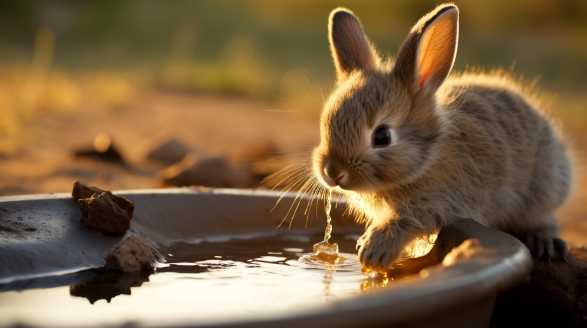
As a rabbit owner, one of the most crucial aspects of caring for your furry friend is ensuring they stay properly hydrated. Just like humans, rabbits need an adequate amount of water to stay healthy and happy.
I will look into the topic of hydration for rabbits, providing you with all the essential information you need to know to keep your bunny hydrated and thriving.
Why is Hydration Important for Rabbits?
Before we look into the specific water requirements for rabbits, it’s important to understand why hydration is so crucial for their overall well-being. Here are a few reasons why proper hydration is vital for rabbits:
- Regulates body temperature: Water helps rabbits regulate their body temperature, which is especially important during hot weather or if they live in a warm climate.
- Promotes healthy digestion: Adequate water intake aids in the digestion process, preventing common issues like gut stasis, which can be life-threatening for rabbits.
- Prevents urinary tract problems: Rabbits are prone to urinary tract issues, including kidney stones. Drinking enough water can help flush out their urinary system, preventing these problems.
- Maintains organ function: Proper hydration ensures that organs, such as the kidneys and liver, can effectively perform their functions, contributing to a rabbit’s overall health.
Now that we understand why hydration is essential, let’s dive into the specific water requirements for rabbits.
How Much Water Do Rabbits Need?
The amount of water a rabbit needs can depend on several factors, such as their size, age, and diet. On average, a rabbit should consume around 50-150 milliliters of water per kilogram of body weight daily.
To ensure your rabbit gets enough water, consider the following tips:
- Always provide fresh water: Rabbits should have access to fresh, clean water at all times. Change their water bowl or bottle daily to keep it free of contaminants.
- Monitor water intake: Regularly check your rabbit’s water bowl throughout the day to see if they are drinking enough. If you notice a significant decrease in their water intake, it may indicate a health problem and a veterinarian visit may be necessary.
- Water-rich vegetables: In addition to providing water, you can also include water-rich vegetables in your rabbit’s diet, such as cucumber and lettuce. These foods can contribute to their overall hydration.
- Offer multiple water sources: Consider placing multiple water bowls or bottles throughout your rabbit’s enclosure, ensuring that they always have access to water regardless of where they are in their space.
Factors Affecting Water Intake
While the average water intake mentioned above provides a general guideline, it’s important to note that certain factors can influence a rabbit’s water consumption. These factors include:
- Environment: Hotter temperatures or a particularly warm climate can cause rabbits to drink more water to stay hydrated.
- Dietary content: Feeding your rabbit a predominantly dry pellet-based diet may result in increased water intake, as they will need more moisture to compensate for the lack of natural hydration.
- Health conditions: Certain health conditions and medications can affect a rabbit’s water intake. If your rabbit has a medical condition, consult with your veterinarian for guidance on their specific water requirements.
- Pregnancy or nursing: Pregnant or nursing rabbits may require additional water to support their increased nutritional needs during this period.
Signs of Dehydration in Rabbits
Just like humans, rabbits can become dehydrated if they don’t get enough water. Recognizing the signs of dehydration is crucial for addressing the issue promptly.
- Lethargy: A dehydrated rabbit may become lethargic and show a lack of interest in their usual activities.
- Sunken eyes: Dehydration can cause a rabbit’s eyes to appear sunken or dull.
- Dry mouth and nose: A dehydrated rabbit may have a dry mouth and nose, which can be noticeable when petting or handling them.
- Loss of appetite: A decrease in appetite can be a sign of dehydration in rabbits.
If you notice any of these signs, it’s important to take immediate action to rehydrate your rabbit.
Ensuring that your rabbit gets enough water is vital for their overall health and well-being. By providing fresh water, monitoring their intake, and considering factors that may affect their hydration needs, you can help keep your furry friend adequately hydrated.
With proper care and attention to hydration, your rabbit will lead a happy and healthy life.
Vegetable Juices: Should Rabbits Drink Carrot Juice or Celery Juice?
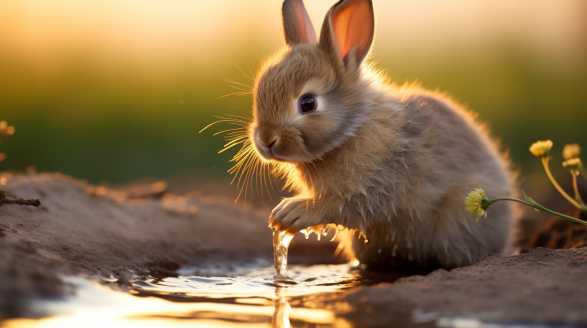
As a proud rabbit owner, I constantly find myself questioning what is best for my furry friend’s diet. Recently, the topic of vegetable juices came up, and I couldn’t help but wonder if rabbits can safely consume carrot juice or celery juice.
The Nutritional Needs of Rabbits
Before delving into the world of vegetable juices, it’s important to understand the nutritional needs of rabbits. Rabbits are herbivores and thrive on a diet rich in fiber, with a primary focus on hay and fresh vegetables.
A typical rabbit’s diet should consist of:
- Hay: Timothy hay, orchard grass, or oat hay should make up the majority of a rabbit’s diet. It promotes healthy digestion and keeps their teeth trim.
- Fresh Vegetables: A variety of leafy greens, such as kale, spinach, and lettuce, along with herbs like parsley or cilantro, should be part of their daily diet. These vegetables supply essential vitamins and minerals.
- Pellets: High-quality rabbit pellets with balanced nutrition can be included in their diet as a supplement. However, these should only make up a small portion of their overall intake.
- Water: Fresh and clean water must be available for rabbits at all times. Hydration is crucial for their overall well-being.
Now that we understand the basics, let’s explore the vegetable juices rabbits can consume.
Carrot Juice: Nutrient-Rich and Appetizing
Carrot juice is a vibrant and nutrient-packed option that many humans enjoy. But, is it safe for our rabbit companions?
Pros:
- Carrots are an excellent source of Vitamin A and other essential nutrients.
- The juice is hydrating and can offer a refreshing variation to a rabbit’s diet.
- Some rabbits adore the taste, which encourages water consumption.
Cons:
- Carrot juice is sweet and high in natural sugars. While small amounts can be beneficial, excessive sugar intake can lead to digestive issues like diarrhea.
- It’s crucial to provide carrot juice as an occasional treat rather than a primary source of hydration, as it lacks the necessary fiber content found in fresh vegetables and hay.
Celery Juice: A Low-Calorie Hydrating Option
Celery juice, often praised for its detoxifying properties, is another option to consider for your rabbit. Let’s explore the pros and cons of introducing this vegetable juice into their diet.
Pros:
- Celery is rich in water content, providing hydration for rabbits, especially during hot weather.
- It is low in calories and can be a refreshing treat without adding excess weight.
- Celery juice contains some essential vitamins such as Vitamin K and Vitamin C that could contribute to your rabbit’s overall health.
Cons:
- Celery contains a high amount of water and lacks the necessary fiber content to maintain a healthy digestive system. It should not replace fresh vegetables or hay in a rabbit’s diet.
- While celery juice can be a safe and refreshing option in moderation, excessive consumption may lead to loose stool or diarrhea due to its high water content.
Moderation is Key
When it comes to offering vegetable juices to your rabbit, moderation is crucial. While carrot juice and celery juice can be a welcomed addition to their diet, they should not replace their main sources of nutrition, namely hay and fresh vegetables.
Remember these key points:
- Vegetable juices should only be offered as an occasional treat, not a staple part of a rabbit’s diet.
- Always dilute the juice with water to reduce the sugar content and provide hydration.
- Monitor your rabbit’s stool and general health. If you notice any changes or digestive issues, halt the consumption of vegetable juices immediately and consult a veterinarian.
In the world of vegetable juices, rabbits are better off sticking to the basics. While carrot juice and celery juice may seem appealing, they should only be given as occasional treats in small quantities.
Always prioritize their nutritional needs and consult with a veterinarian if you have any concerns.
By keeping our rabbits’ diets in check and providing them with a diverse range of foods, we can ensure their well-being and give them the best chance at a happy and healthy life.
Water Quality: Filtering and Purifying Options for Rabbits
As a rabbit owner, one of your top priorities should be ensuring that your furry companion has access to clean and safe water. Water quality plays a crucial role in the overall health and well-being of rabbits.
Importance of Water Quality for Rabbits
Rabbits, like any other living beings, require access to fresh and clean water to maintain proper hydration, digestion, and overall health. Poor water quality can lead to various health issues such as dehydration, gastrointestinal problems, and even kidney damage.
Common Contaminants in Rabbit’s Water
Before diving into the various filtering and purifying options, it’s important to understand the potential contaminants that can be present in your rabbit’s water supply. Here are some common water contaminants that can negatively impact the health of your beloved bunnies:
- Chlorine: Tap water often contains chlorine, which is used as a disinfectant by water treatment facilities. While safe for humans, chlorine can irritate and harm the sensitive digestive systems of rabbits.
- Heavy Metals: Some water sources may contain trace amounts of heavy metals such as lead, copper, and zinc, which can pose a health risk to rabbits if consumed regularly.
- Bacteria and Protozoa: Untreated water sources, such as well water or water collected from natural bodies like ponds, can be contaminated with harmful bacteria like E. coli and protozoa like Giardia. These microorganisms can cause severe digestive disturbances in rabbits.
- Pesticides and Chemicals: Agricultural runoff or contaminated water sources near industrial areas may contain pesticides, herbicides, and other chemicals that are harmful to rabbits when ingested.
Now that we understand the potential contaminants present in rabbit’s water, let’s explore various filtering and purifying options available to ensure optimal water quality.
Filtering Options
- Activated Carbon Filters: Activated carbon filters are inexpensive and commonly used to remove chlorine and other chemicals from tap water. These filters work by adsorbing contaminants onto their surface, providing cleaner and better-tasting water for rabbits.
- Reverse Osmosis Filters: Reverse osmosis (RO) filters are highly effective in removing various contaminants, including heavy metals, pesticides, and bacteria. However, it’s worth noting that RO filters may remove essential minerals from the water as well. Consider adding mineral supplements to the filtered water to ensure a balanced diet for your rabbits.
- Ceramic Filters: Ceramic filters are made from diatomaceous earth and are effective in removing bacteria and other impurities from water. They are affordable and easy to use, making them ideal for small-scale rabbit water filtration.
Purifying Options
- Boiling Water: Boiling water is a simple and effective way to purify it from harmful bacteria and protozoa. Bringing water to a rolling boil for at least five minutes can eliminate most microorganisms, providing safe drinking water for rabbits.
- UV Sterilizers: UV sterilizers use ultraviolet light to kill bacteria, viruses, and other microorganisms in water. While these devices are effective, they can be expensive and require regular maintenance to ensure proper functioning.
- Water Distillers: Water distillation involves heating water to its boiling point, then collecting the steam and condensing it back into liquid form. This process removes many contaminants, including heavy metals and chemicals. However, distilled water lacks essential minerals and can be slightly acidic, so it’s important to supplement your rabbit’s diet accordingly.
Ensuring high water quality for your rabbits is vital for their overall health and well-being. The filtering and purifying options mentioned in this article can help remove potential contaminants, providing your rabbits with access to safe and clean drinking water.
Understanding the Role of Hydrating Foods in a Rabbit’s Diet
Having a pet rabbit is a wonderful experience, but it also comes with great responsibility. As a rabbit owner, one of the most vital aspects of caring for your furry friend is ensuring they have a healthy and well-balanced diet.
I will help you understand the crucial role of hydrating foods in a rabbit’s diet and why they are essential for their overall well-being.
Why Hydration Matters for Rabbits
Rabbits are known for their love of water-rich foods like lettuce, cucumbers, and watermelon. These hydrating foods play a crucial role in maintaining optimal hydration levels in rabbits.
When rabbits are dehydrated, it can lead to serious health issues such as urinary tract problems, digestive disorders, and even heat stroke during warmer months.
Consequently, incorporating hydrating foods into a rabbit’s diet is important to ensure they receive sufficient hydration, particularly if they are not consuming enough water from their water bottle or bowl.
Benefits of Hydrating Foods for Rabbits
Including hydrating foods in your rabbit’s diet offers numerous benefits, both in terms of hydration and overall well-being. Some of the key advantages are:
- Improved Hydration: Hydrating foods have a high water content, which aids in keeping your rabbit hydrated and prevents dehydration-related health issues.
- Enhanced Digestion: Foods rich in water content can support healthy digestion in rabbits. The water helps soften their stools, making it easier for them to pass, reducing the risk of gastrointestinal problems.
- Weight Control: Hydrating foods generally have a lower calorie content compared to other foods, making them an excellent option for weight control in rabbits.
- Promotes Dental Health: Crunchy vegetables and fruits in a rabbit’s diet can help wear down their constantly growing teeth, promoting good dental health.
- Variety in Diet: Introducing hydrating foods adds diversity to a rabbit’s diet, keeping them interested and engaged with their food.
Hydrating Foods for Your Rabbit
Now that we’ve discussed the importance and benefits of hydrating foods for rabbits, let’s explore some specific options you can include in their diet to ensure adequate hydration:
1. Lettuce
Lettuce, especially varieties like romaine or green leaf lettuce, makes an excellent hydrating option for your rabbit. It has a high water content and is generally well-tolerated by most rabbits.
2. Cucumbers
Cucumbers are another fantastic hydrating food for rabbits. They are refreshing, crunchy, and contain a significant amount of water.
3. Watermelon
Watermelon is not only a summertime favorite for humans but also a hydrating treat for rabbits. Its juicy flesh contains lots of water and can be a refreshing snack for your bunny.
4. Celery
Celery is a crunchy treat that is not only hydrating but also high in fiber. The high water content in celery makes it an excellent option for rabbits, and the fibrous nature can aid in maintaining healthy digestion.
Moderation is Key
While it’s important to incorporate hydrating foods into your rabbit’s diet, it’s equally vital to exercise moderation. While these foods offer hydration benefits, they should not be the sole focus of their diet.
Understanding the role of hydrating foods in a rabbit’s diet is crucial for every responsible rabbit owner. By including hydrating foods like lettuce, cucumbers, watermelon, and celery, you can ensure your bunny receives sufficient hydration, improved digestion, and overall better health.
So, let’s add some hydrating foods to our bunny’s meal plan and keep them happy, healthy, and hydrated!
Beyond Water: Exploring Other Beverages for Rabbits
As a rabbit owner, you may be wondering if there are alternative beverage options for your furry friend beyond just water. While water should always remain the primary source of hydration for rabbits, there are certain other beverages that can be introduced in moderation to provide variety and added nutrients to their diet.
The Importance of Hydration
Before we embark on exploring beverage options for rabbits, it is crucial to understand the significance of proper hydration in these adorable creatures. Rabbits require an adequate amount of water to maintain their overall health and well-being.
While clean and fresh water should always be available to rabbits at all times, offering other suitable beverages can provide a change of taste and encourage them to drink more fluids, thus promoting hydration.
Vegetable Juices
Carrot Juice
Carrots are not only a beloved treat for rabbits but also serve as a fantastic base for a nutritious beverage. Carrot juice is packed with essential vitamins and minerals, including vitamin A, which helps maintain optimal eye health for rabbits.
To prepare carrot juice for your rabbit, follow these simple steps:
- Wash and peel fresh carrots.
- Cut the carrots into small pieces.
- Blend the carrot pieces with a small amount of water until you achieve a smooth consistency.
- Strain the mixture to remove any remaining solids.
- Dilute the juice with an equal amount of water.
Beetroot Juice
Beetroot juice is another nutritious option that can be introduced to rabbits. It contains antioxidants that contribute to overall well-being and helps support a healthy cardiovascular system.
To prepare beetroot juice for your rabbit:
- Thoroughly wash and peel a fresh beetroot.
- Cut the beetroot into small cubes.
- Blend the cubes with a small amount of water until smooth.
- Strain the mixture to eliminate any solids.
- Dilute the juice with an equal amount of water.
Herbal Infusions
Chamomile Tea
Chamomile tea has soothing properties and can be beneficial for rabbits experiencing digestive issues or stress. It aids in relieving gastrointestinal discomfort and provides a pleasant taste.
To prepare chamomile tea for your rabbit:
- Choose a high-quality loose chamomile tea or tea bags without any added flavors or sugars.
- Steep the tea in hot water for around 5 minutes.
- Allow the tea to cool down to room temperature before serving small quantities to your rabbit.
Peppermint Tea
Peppermint tea is another herbal infusion that can be offered to rabbits. It has a refreshing taste and can help alleviate digestive issues such as gas or bloating.
To prepare peppermint tea for your rabbit:
- Select a high-quality loose peppermint tea or tea bags with no added flavors or sugars.
- Steep the tea in hot water for approximately 7 minutes.
- Let the tea cool to room temperature before providing small amounts to your rabbit.
Fruit Blends
Apple and Mint Blend
Combining fruits with herbs can create an exciting beverage option for rabbits. The sweetness of apples paired with the refreshing flavor of mint make for a delightful drink.
To prepare an apple and mint blend:
- Thoroughly wash and core an apple, removing the seeds.
- Cut the apple into small pieces.
- Brew a peppermint tea according to the instructions mentioned earlier.
- Blend the apple pieces and the peppermint tea until smooth.
- Strain the mixture to ensure a liquid consistency.
Offering alternative beverages to your rabbit can provide a much-needed change from regular water intake while offering additional health benefits. However, it is crucial to remember that these beverages should always be introduced in moderation and should never replace fresh water.
Remember, happy and hydrated rabbits make for content and healthy companions.
Conclusion
In conclusion, keeping your rabbit hydrated and healthy is of utmost importance. Water is the key to their well-being, aiding in digestion, preventing dehydration, and regulating their body temperature.
Remember, rabbits should consume approximately 50-150ml of water per kg of body weight per day, but individual needs may vary.
While water should always be their primary source of hydration, there are other beverage options that can be introduced in moderation. Carrot and beetroot juices can provide added nutrients, but they should be diluted with water to avoid excess sugar intake.
Fruit blends like apple and mint can offer a refreshing and exciting choice, but they should be given sparingly due to their sugar content.
Water quality is vital, and various filtering and purifying options can be used to ensure clean and safe water for rabbits. Activated carbon filters, reverse osmosis filters, ceramic filters, boiling water, UV sterilizers, and water distillers are all effective methods to remove potential contaminants.
Incorporating hydrating foods into their diet, such as lettuce, cucumber, and watermelon, ensures rabbits receive sufficient hydration and contributes to their overall health. Moderation is key, as these foods should complement a balanced diet primarily consisting of hay, fresh vegetables, and water.
Lastly, always consult with a veterinarian who specializes in rabbit care for personalized advice and guidance. Each rabbit is unique, and their specific needs may vary.
So, take the necessary steps to keep your rabbit hydrated, and enjoy the joy and companionship they bring to your life!
Frequently Asked Questions
What do rabbits drink?
Rabbits primarily drink water to stay hydrated. However, there are a few essential details to keep in mind regarding their drinking habits:
How much water should a rabbit drink daily?
On average, a healthy adult rabbit should consume around 50-150 milliliters (2 to 5 ounces) of water per kilogram of body weight every day. This may vary based on factors such as weather, diet, and activity level.
Can rabbits drink tap water?
While tap water is generally safe for rabbits, it is advisable to provide them with fresh, filtered, or bottled water. Tap water may contain chemicals, such as chlorine or fluoride, which can be harmful to rabbits in high quantities.
Should rabbits drink cold or warm water?
Rabbits prefer room temperature or slightly cool water. Avoid giving them extremely cold water, as it can cause discomfort or shock their system.
What are the best water sources for rabbits?
The ideal water source for rabbits is a clean and sturdy water bottle with a sipper tube. This prevents contamination and keeps the water fresh for a longer duration.
How often should I change my rabbit’s water?
To maintain proper hygiene, it is crucial to change your rabbit’s water every day. This helps prevent the accumulation of bacteria or algae growth in the water bottle.
Can rabbits safely drink other liquids?
No, it is not recommended to provide rabbits with any other liquids apart from water. Rabbits have specific dietary needs, and providing them with liquids such as juice, milk, or soda can disrupt their digestive system and lead to health issues.
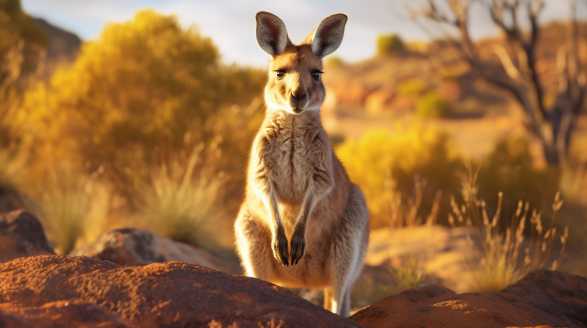
Are Kangaroos Related To Rabbits
Introduction Are kangaroos related to rabbits? Let’s find out. Buckle up, because this is going to be a adventure! Picture this: you find yourself in the vast Australian outback, surrounded by the breathtaking landscapes that stretch as far as the eye can see. Suddenly, you spot a kangaroo bounding effortlessly across the plains, its powerful […]
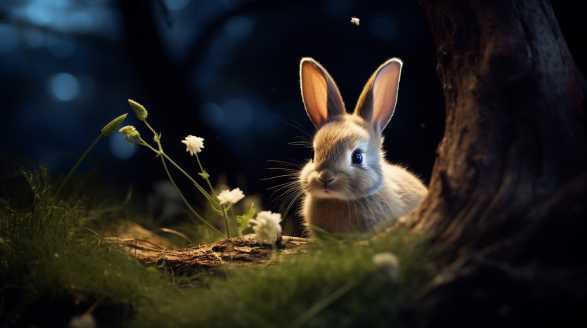
Are Rabbits Nocturnal
Introduction Are rabbits nocturnal? Let’s find out. With its fluffy tail and twitching nose, the rabbit has become the star of my wildlife exploration. But what truly fascinates me is their nocturnal behavior. Imagine venturing into the depths of night to witness their hidden world come to life. It’s like finding a secret portal to […]
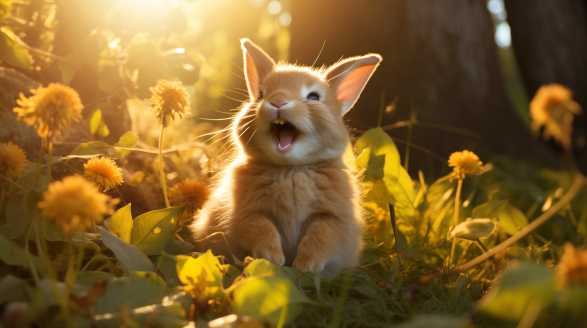
How Often Do Rabbits Poop
Introduction How often do rabbits poop? Let’s find out. Now, I know what you’re thinking – why on earth would anyone want to talk about rabbit poop? But let me tell you, my curious friend, there’s more to these tiny pellets than meets the eye. Imagine this: you find yourself pondering about the frequency at […]
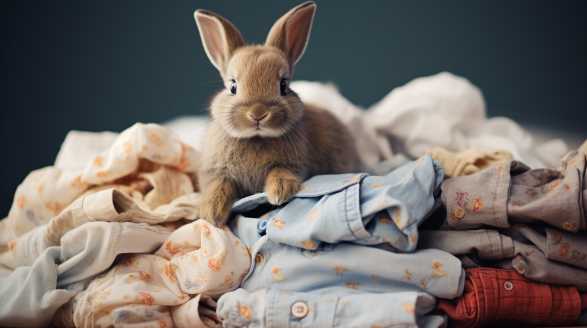
Why Do Rabbits Bite Your Clothes
Introduction Hey there, rabbit owners! We know how delightful it is to have these fluffy creatures hopping around our homes. Can you relate? Don’t worry, we’ve got your back! we’re diving into the fascinating world of rabbit behavior and tackling the topic of fabric chewing head-on. We’ll explore the reasons behind why rabbits have a […]
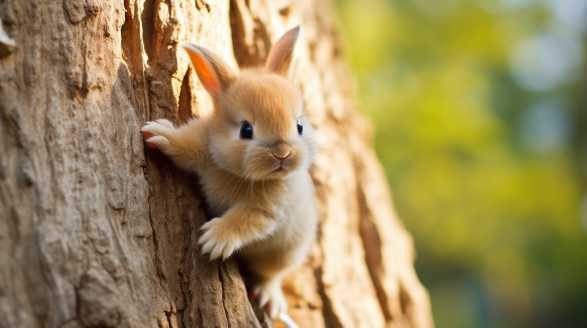
Can Rabbits Climb
Introduction Can rabbits climb? Let’s find out. Trust me, you won’t want to miss this! As a self-proclaimed rabbit enthusiast and owner of not just one, but multiple pet rabbits, I can honestly say that these furballs of cuteness have a secret side that will blow your mind. Today, we’re delving into the age-old question: […]
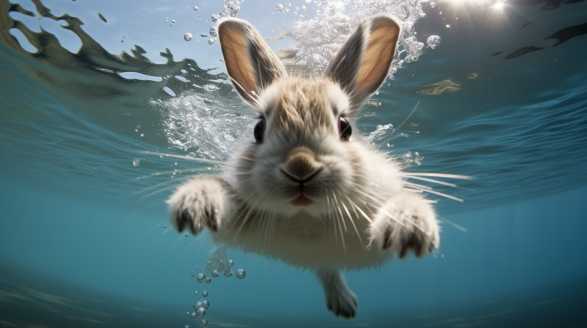
Can Rabbits Swim
Introduction Can rabbits swim? Let’s find out. Together, we’re about to embark on an underwater adventure to uncover the truth behind rabbits and their hidden aquatic abilities. Picture this: fluffy little rabbits gracefully gliding through the water, their ears adorably upright as they navigate the depths below. Sounds pretty incredible, right? It’s like discovering a […]
